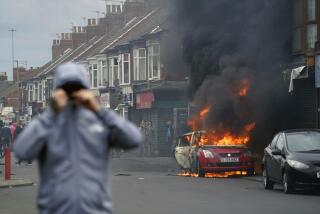Brown warns of a ‘long-term threat’
- Share via
LONDON — Prime Minister Gordon Brown’s first days in office have been a baptism by fire, with three soldiers killed Thursday in Iraq, two car bombings foiled Friday in London and a fiery attack Saturday on Scotland’s Glasgow Airport. On Sunday, he warned the British public that they faced “a long-term threat” from Islamist militants.
Brown has indicated he will shift Britain away from his predecessor Tony Blair’s whole-hearted support of the U.S.-led war in Iraq, but the attacks appear timed to push the government to move further and faster, and to deliver a message that the violence is directed at the policies, not the person.
“It was an obvious attempt to destabilize the government and to get the government to withdraw troops from Iraq,” said Patrick Dunleavy a political analyst at the London School of Economics.
Previous plots have been focused on London, so the choice of Glasgow in particular reinforced the belief among officials and counter-terrorism experts that the attacks were designed to correspond with the ascension of Brown, a Scotsman.
The longtime finance minister, more accustomed to crunching numbers than confronting terrorism, responded with characteristic seriousness. He raised the national security alert to the highest level, “critical,” and said security would be increased at airports and other crowded venues, vehicle searches would be stepped up and Britons would have to remain vigilant while still carrying on normal daily life.
“We’re dealing with a long-term threat. It’s not going to go away in the next few weeks or months. We have to fight it in a number of different ways -- militarily, by security, by police, by intelligence,” he said in a nationally televised interview Sunday on BBC One. “We have got to also fight it as a battle of hearts and minds. We have got to separate, if you like, those great moderate members of our community from a few extremists who wish to practice both violence and inflict maximum loss of life in the interest of the perversion of their religion.”
Brown’s lengthy, cerebral responses distinguished him from Blair, who was known for his sound bites and emotive speeches. But analysts said it was a distinction lost on militants.
Paul Wilkinson, an anti-terrorism expert at St. Andrews University in Scotland, agreed that the attacks “came because of a change in government, a new prime minister and a new Cabinet. We know that Al Qaeda has followed political events and tried to use its terrorism as a weapon to send messages to new governments.”
This was seen most clearly in the 2004 Madrid train bombings, which left 191 dead three days before the Spanish elections. The conservative government of Prime Minister Jose Maria Aznar, which supported the Iraq war, lost the vote to the Socialists, who quickly pulled troops out of the U.S.-led coalition.
The failure of the attacks in Britain led some analysts to suggest that they had been prepared in haste to coincide with Brown taking the helm from Blair.
The Mercedes sedans discovered in London were packed with propane, gasoline and nails with potential for huge, fatal explosions in the central theater and nightclub district. In Glasgow, two men drove a Jeep Cherokee into the doors of the main airport terminal, where it caught fire.
The failures have helped Brown, with the attackers looking like amateurs and the government like a professional. But Britons also realize how much luck was involved and how close they came to another tragedy like the London transit bombings in 2005, which killed 52 people. And the attempted use of car bombs brings home to Britain the kind of violence that Iraqis and British soldiers in Iraq face every day.
“I think the public will rally around the government,” said Dunleavy of the London School of Economics. “This wasn’t in the Gordon Brown planning at all. The whole planning was for a very carefully orchestrated succession.”
Political analysts generally gave Brown good marks for his handling of the incidents so far and said the events were certain to raise the fight against terrorism to the top of his agenda.
In the BBC interview, Brown said that irrespective of Britain’s involvement in the U.S.-led wars in Afghanistan and Iraq, “we have an international organization that is trying to inflict the maximum damage on civilian life in pursuit of a terrorist cause.... We’re in the business of dealing with a long-term threat, a sustained threat that is unrelated in detail to one specific point of conflict in the world.”
Even before the attacks, Brown had made a number of high-level security appointments to signal he was tough on terrorism, and began drafting proposals to extend the amount of time a suspect can be held without charges from 30 days to closer to 90 days.
He reportedly planned to lift a ban on questioning suspects after charges are filed, and to allow use of wiretap evidence in court against terror suspects.
--
Stobart reported from London and Miller from Paris.
More to Read
Sign up for Essential California
The most important California stories and recommendations in your inbox every morning.
You may occasionally receive promotional content from the Los Angeles Times.












